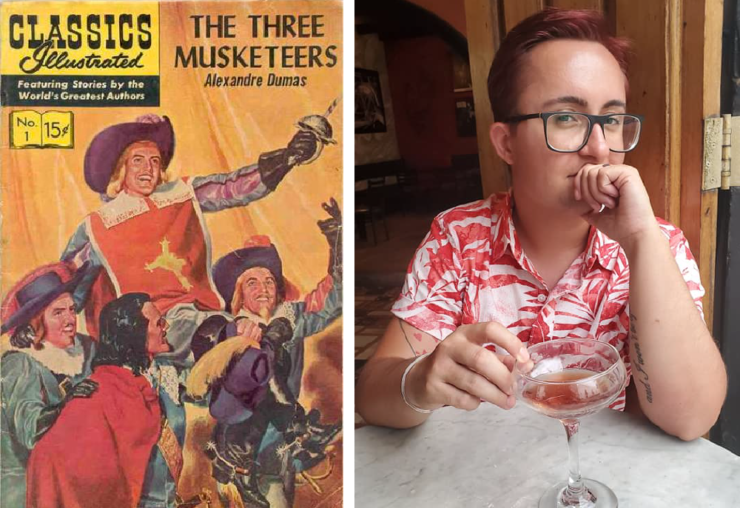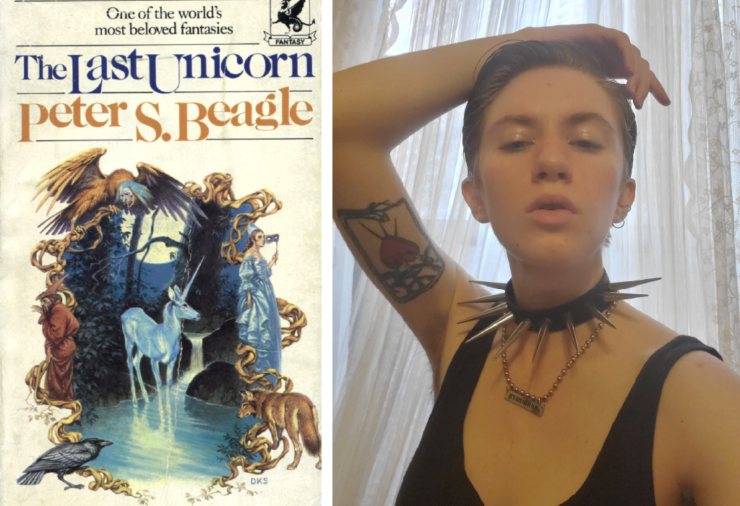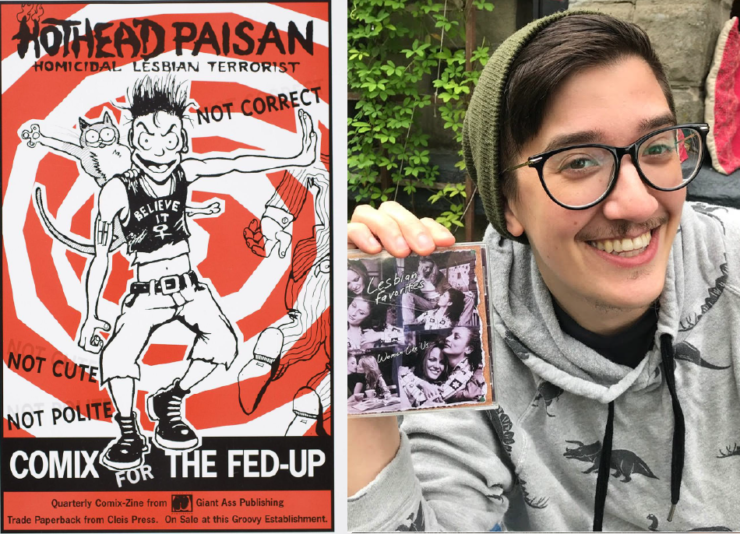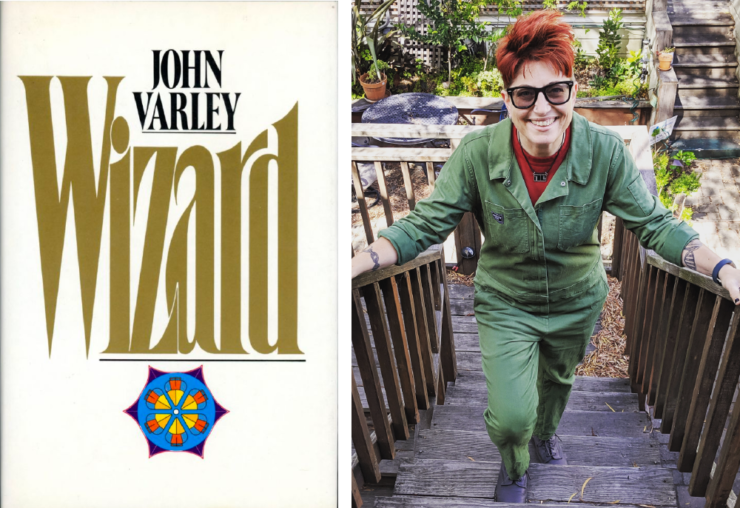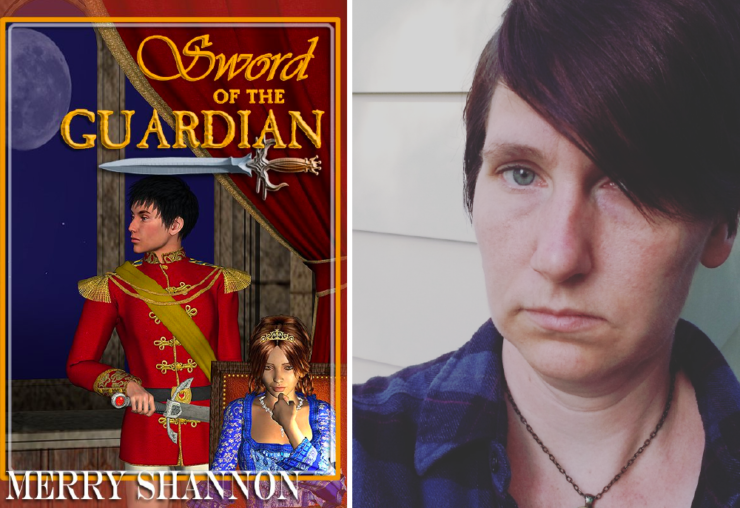I know there have been dozens of Three Musketeers movies made, but have you ever read the book? Because I have to tell you, that book is quite delightfully, playfully, incredibly gay.
I mean, I didn’t figure out my queer identity until adulthood, but that didn’t stop me from crushing on female heroines like Jo March or Alanna of Trebond, or imagining that I was Robin Hood or Taran the assistant pig-keeper. There are lots of books in my past that queered me, or that I queered in my own imagination, but I will always have a special place in my soul for The Three Musketeers. From Aramis’ “dreamy eye”, to d’Artagnan’s meteoric rise to heroism, to the fact that the book is mostly just there to give you lush descriptions of 17th century Paris (right down to exacting depictions of each of the musketeer’s households and affairs, and also the Queen’s), it was pretty much a fledgling trans boy’s gay dream.
D’Artagnan arrives in Paris at the beginning of the story with ambitions of becoming one of the King’s musketeers, a group of people he greatly reveres. He arrives without the letter of introduction from his father–an acquaintance of Monsieur de Tréville, the commander of the musketeers–but with a good deal of belief in his own merit as a potential recruit for this group of daring, devil-may-care soldiers, who walk a precise line between being half-drunk rabble-rousers and soldiers who swear to the highest of intentions and nobility. Despite d’Artagnan’s respect for this group, he manages to immediately have the most ridiculous confrontations with all three of the musketeers for whom the book is named, three hilarious meet-cutes that lead very speedily to deep, abiding bond between the four men.
But here’s the thing about d’Artagnan: he’s basically just an audience surrogate. (Or is it a Gary Stu? I’m never quite sure.) The book opens with him arriving in Paris from distant, provincial Gascony, and he knows very little about anything, the same as the reader. Other than being equal parts ignorant and talented, he doesn’t have very much of a character.
He’s still a lot of fun, though. The book starts out by calling him “a young Don Quixote,” which is a hilarious description, when you think about it, because if you remove Alonso Quixano’s long life history and struggle with dementia from the story of Don Quixote, you get a one-dimensional character who is impetuous and obsessed with a very abstract idea of chivalry, and who attacks windmills not because he believes they are giants, but because he just doesn’t know any better. And the rest of d’Artagnan’s personality is just as vaguely idealized. In addition to the hotheadedness (apparently this is a stereotype about people from Gascony) his qualities are as follows:
- Young–Being young and pretty is very important in the men of this story.
- Very noble–According to the standards of his time, that is, which seems mostly to mean acting in a courtly fashion while also trying to fight anyone who looks at you.
- An incredible swordsman–Even though d’Artagnan is just a country kid with little practical experience in real fights, he takes out two of the best swordsmen in Paris in the space of two days.
- The smartest of the group–This is stated frequently by both his friends and the narration, despite d’Artagnan’s constant impulsive blunders.
And that’s basically it. As a result, it’s easy for a reader to sort of slip into the roll of d’Artagnan; he’s a blank-slate hero for you to graft onto yourself. As someone who was assigned female at birth, I found particular freedom in imaging myself as d’Artagnan, because I could never let my emotions fly the way he does, and act as rashly he does. Not only does d’Artagnan get away with all his daring, impulsive moves, he always ends up doing something amazing, and getting praised for it. And while this is certainly unrealistic, it’s also, well, pretty awesome.
I never fit in with other boys. I didn’t even know growing up that I was a boy, but the longing for it was there. I wasn’t really interested in playing their games, in the aggressive attitudes or the rule breaking, in sneaking off to shoot beer bottles or light aerosol can fires, but I wanted to convince myself to be. I wanted male friends, I wanted to be part of their groups and share in their bonds. I wanted to keep playing with my male cousins, as we began to grow up and apart. I wanted to be recognized as a boy, to be mentored by the male teachers I looked up to. I never had that belonging in my real life, but through d’Artagnan, I had a way to imagine that I did, a young man living fearlessly in a world of men, striding through life and swinging my, erm, sword around at anyone who dared look at me sideways.
D’Artagnan has a ridiculous amount of personal and professional success, starting the book as an unemployed nobody and ending it as lieutenant in the Musketeers. But more than that, he finds male companions who accept him, support him, and laud him as the best of all of them. He had friends, and very manly ones at that.
Manly… and also very gay. Because spending time with my male cousins was great and all, but none of them were much like me. And they definitely weren’t as gay as I am. Athos, Porthos, and Aramis, however? Queer AF.
Let’s take them in the same order the book does. First, there’s Athos. He’s the elder statesman gay, with a mysterious past that he won’t tell anyone about, and the look of someone who comes from nobility. Despite being the most aloof of the three, he takes on a slightly paternal attitude towards d’Artagnan, giving their relationship a bit of a Batman and Robin sort of vibe, which is only enhanced by the way Athos’s story is shaped by tragedy and, eventually, by revenge.
When we first meet Athos, he has been wounded in a skirmish between the King’s and the Cardinal’s musketeers. His injury provides the meet-cute with d’Artagnan, who knocks into Athos when trying to catch up to someone else. Athos is, understandably, upset, and tells d’Artagnan off.
“Monsieur,” said Athos, letting him go, “you are not polite; it is easy to perceive that you come from a distance.”
D’Artagnan had already strode down three or four stairs, but at Athos’s last remark he stopped short.
“Morbleu, monsieur!” said he, “however far I may come, it is not you who can give me a lesson in good manners, I warn you.”
“Perhaps,” said Athos.
“Ah! If I were not in such haste, and if I were not running after someone,” said d’Artagnan.
“Monsieur Man-in-a-hurry, you can find me without running–me, you understand?”
D’Artagnan does understand. Athos is challenging him to a duel, and they arrange location to meet each other at noon. I mean, it’s adorable, right? d’Artagnan is such a sweet idiot, and the blustery tension of the conversation just makes me think of Beatrice and Benedick… or how Xena felt about Gabrielle when they first met.
Then there’s Porthos, a huge man who loves good things, especially food and drink. He’s your favorite gay uncle, a little gullible at times, often too loud, and always showing off, even if that means he has to buy only half a gold belt, and hide the unfinished leather part behind an unseasonably warm cloak. Although often a source of comic relief in the story, Porthos is also the most loyal and dedicated of the group, and can always be relied upon.
D’Artagnan meets Porthos directly after meeting Athos, when he gets caught in Porthos’s cloak while trying to squeeze by in too small a space (like that paparazzi pic of Chris Evans squeezing awkwardly between a van and some guy outside a club). D’Artagnan manages to get so caught up in the windblown cloak, in fact, that he ends up smashed into Porthos’s back, with his nose up against Porthos’s baldric, or shoulder belt. You know, the one that’s only gold on the front.
“And do you always forget your eyes when you run?” asked Porthos.
“No,” replied d’Artagnan, piqued, “and thanks to my eyes, I can see what other people cannot see.”
Whether Porthos understood him or did not understand him, giving way to his anger, “Monsieur,” said he, “you stand a chance of getting chastised if you rub Musketeers in this fashion.”
“Chastised, Monsieur!” said d’Artagnan, “the expression is strong.”
“It is one that becomes a man accustomed to look his enemies in the face.”
“Ah, pardieu! I know full well that you don’t turn your back to yours.”
And the young man, delighted with his joke, went away laughing loudly.
Porthos isn’t going to let the insult go, however, and d’Artagnan ends up with a second duel, this one scheduled for one o’clock. And I mean, where do I start? Should we talk about d’Artagnan getting “chastised” for “rubbing” Musketeers? There’s even an earlier bit that describes him “wiggling against Porthos’s back.” Honestly, I was going to analyze this more for you, but the text really does speaks for itself.
And so we come to Aramis, my boyfriend.
He was a stout man, of about two- or three-and-twenty, with an open, ingenuous countenance, a black, mild eye, and cheeks rosy and downy as an autumn peach. His delicate mustache marked a perfectly straight line upon his upper lip; he appeared to dread to lower his hands lest their veins should swell, and he pinched the tips of his ears from time to time to preserve their delicate pink transparency. Habitually he spoke little and slowly, bowed frequently, laughed without noise, showing his teeth, which were fine and of which, as the rest of his person, he appeared to take great care.
Cheeks rosy and downy as an autumn peach? Holding his hands in the air to keep the veins from swelling? A perfect little black mustache? He’s like a French Don Diego de la Vega. Be still, my little gay teenage heart.
Now, one of the books main failings, for a modern reader, is its fairly prevalent misogyny. Very early on in the book, the musketeers impress upon young d’Artagnan that men are basically at war with women, and when d’Artagnan does fall for a woman, she’s married and really wishes he would leave her alone, especially since his whiny attentions keep endangering the spy work she’s doing at court on behalf of Queen Anne. Aramis is also a passionate lover, and is revealed to be deeply involved in the same court intrigue that d’Artagnan also becomes tangled up in over the course of the novel. He has intense affairs with women, including with the Duchesse de Chevreuse, a confidant of the Queen.
But like d’Artagnan’s feelings for Constance, Aramis’s affairs are so courtly and chivalric as to be basically without any kind of sexuality. The book was published in 1844, after all, and other than spending a little time on what women’s hair or hands look like (less time than it spends on Aramis’s hands), the main push of romance seems to be admiring a woman’s courage (that’s nice), wanting to feel like a brave and heroic protector (which one can also feel about one’s friends, or about the King’s service in general), or needing a wealthy mistress because being a musketeer doesn’t pay enough to live on (basically, they’re all trying to become sugar babies).
Aramis’s is also very ambitious, like d’Artagnan, and the young man admires Aramis greatly. After his encounters with Athos and Porthos, d’Artagnan begins to calm down and realize that maybe he acted a bit stupidly. As he considers how fair it is for Athos to be piqued at having his injury jostled so painfully, and how Porthos would of course respond aggressively to being teased by a stranger, d’Artagnan resolves to be a little more careful and polite–that is, if he survives both duels, which he knows to be unlikely. He thinks of Aramis, who he witnessed earlier, talking with other musketeers (the scene from which we get our delightful ear-pinching description).
“Friend d’Artagnan,” continued he, speaking to himself with all the amenity that he thought due himself, “if you escape, of which there is not much chance, I would advise you to practice perfect politeness for the future. You must henceforth be admired and quoted as a model of it. To be obliging and polite does not necessarily make a man a coward. Look at Aramis, now; Aramis is mildness and grace personified. Well, did anybody ever dream of calling Aramis a coward? No, certainly not, and from this moment I will endeavor to model myself after him. Ah! That’s strange! Here he is!”
But of course, D’Artagnan proceeds to make an absolute fool of himself in front of Aramis, too.
Yet another duel is the result, and when d’Artagnan arrives to his first fight of the day, he finds that Porthos and Aramis are Athos’s seconds. He endeavors to treat the men more gallantly and politely than he had previously (without backing out or otherwise damaging his pride, of course), but his true opportunity to make amends comes when five of the cardinal’s guards come upon the scene and attempt to arrest the men for dueling. The musketeers cannot surrender, as it would disgrace them and put M. de Tréville in a difficult political position, but they are only three against five, and Athos is already wounded. D’Artagnan convinces them to let him fight by their side, even though the guards are ready to let him go, and in the resulting skirmish he is able to kill the leader of the group, as well as provide Athos with support.
Thus, d’Artagnan joins the group whose motto is “All for one, and one for all,” and sets off on a grand adventure I was happy to follow him on. Because like d’Artagnan, I, too, was a young person from the country who dreamed of adventure in the grand, busy parts of the world. Unlike d’Artagnan, I didn’t know what it was like to have deep bosom friendships with other men, though I yearned for it all the same. Years later, knowing myself much better than I did then, I’m still grateful for that clever, brash Gary Stu that allowed me to graft so much of myself onto his story, and for those three handsome, loving Musketeers who claimed me as one of their own.
Sylas K Barrett has always been a swashbuckler at heart, from Robin Hood to Captain Blood, Zorro to the Scarlet Pimpernel. They are all my queer darlings.










